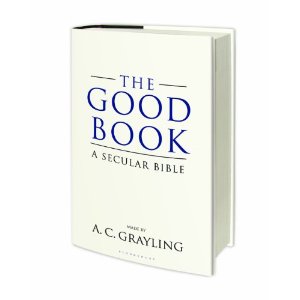
By Erin Williamson
Last Tuesday night, the “nation” that Stephen Colbert so regularly addresses was treated to a guest spot by author and philosopher A.C. Grayling, promoting his new book The Good Book: A Humanist Bible. The segment was first and foremost a wonderfully positive and clear advertisement for humanism as a loving, ethical, and yes, nontheistic lifestance. Plus, Colbert opened with a reference to one of my favorite quotes from one of my favorite television series. Watch the Twilight Zone episode “To Serve Man” and you’ll get it. Genius.
Colbert, donning his ubiquitous hyper-conservative persona, immediately asked Grayling what a humanist was—and whether it was like a pianist. (Do we as humanists play humans, as a pianist would play a piano?) Though obviously a joke, I really appreciate that Colbert gave Grayling the opportunity to explain to the millions that watch The Colbert Report exactly what humanism is. Eloquent and fairly soft-spoken, Grayling highlights a lot of positives that past Colbert or Jon Stewart guests discussing atheism have missed. His book doesn’t criticize religion, nor is it called a “Bible” to ruffle any feathers. He emphasizes that humanism is an ethical lifestance, and that the moral absolute that humanists are guided by arises from science, reason, and human nature, rather than an abstract and often self-contradictory instructions from a God, speaking through man, translated (probably significantly edited) by multiple humans over the centuries since the Bible was written.
Probably the most entertaining and most encouraging part of the segment was when Colbert, in his pseudo-neo-con character, opined that the “Humanist Bible,” unlike the Christian Bible, had nothing in it worth killing someone else over, no dietary restrictions, and nothing forbidding lying with a woman at the time of her menses. That portion of the segment echoes the American Humanist Association’s ad campaign in November 2010, “Consider Humanism,” which compared religious quotes about murder, inequality of the sexes, and warfare to humanist quotes about peace, respect, and equal treatment for all regardless of sex, class, sexuality and religion. Of course there are no calls to kill Canaanites in the Humanist Bible! Humanism inherently calls for the recognition of the value of all humans, regardless of their ethnicity (or ancient tribal affiliation!). Colbert’s signature outlandish outrage at all things moderate provided a perfect stage for both book and author; Grayling and humanism in general were just so reasonable. I especially appreciated that Grayling stated that there was not only no religion-bashing in his book, but that there was no mention of God at all.
Don’t get me wrong—I know that The Colbert Report and The 700 Club do not share audiences, and that this segment will probably inform very few religious fundamentalists that humanism is a moral and ethical standard, taking into account reason, human nature, and science. But the impact of this publicity upon the generally young, moderate, tolerant, and informed audience that tunes in to Jon Stewart and Stephen Colbert on late-night Comedy Central could potentially be tremendous. That demographic seems to be growing more accepting and curious; they also could be the ones who hear a description of humanism and have the “aha!” moment where they finally hear a word to describe their own outlook on life. Grayling may not be the firebrand of Dawkins or Harris, but in my opinion such atheist leaders will be complemented by Grayling’s demeanor for a broader mass appeal that humanism deserves.
I hope that with the Colbert spot, A.C. Grayling’s The Good Book: A Humanist Bible can knock Todd Burpo’s ridiculous Heaven is for Real from the number one spot on the New York Times’ bestseller nonfiction list (although I’m sure that belongs under fiction).
Erin Williamson is the Development and Communications Assistant for the American Humanist Association.
